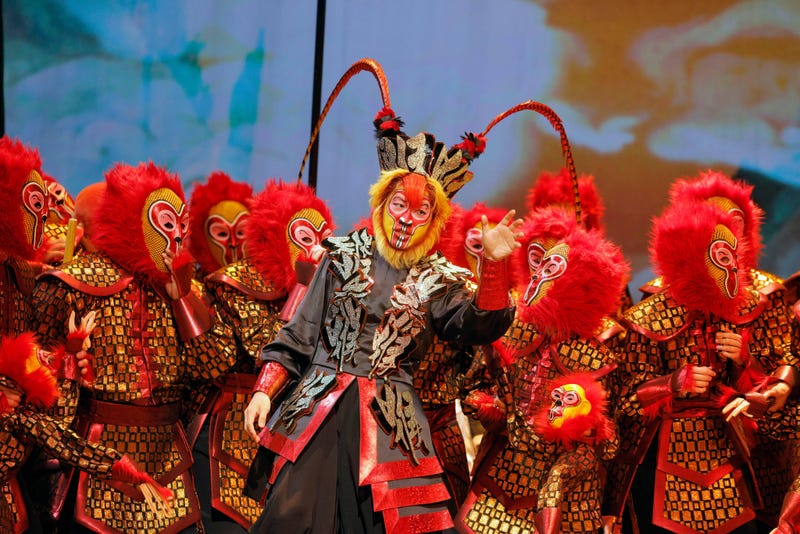
SAN FRANCISCO (AP) — A rascally superhero born from a stone egg, the Monkey King is beloved in Chinese mythology, appearing in everything from a 16th century epic to modern comics, animated movies and video games — even in poetry by Mao Zedong.
And now he’s the star of an opera.
“The Monkey King,” with music by Huang Ruo and libretto by David Henry Hwang, has its world premiere at the San Francisco Opera on Friday with performances through Nov. 30.
It’s adapted from “Journey to the West,” a 100-chapter novel inspired by the true story of a 7th-century Chinese monk who traveled to India to find Buddhist sutras, or scriptures, and bring them back home.
“It’s essentially an allegory of how Buddhism came to China,” Hwang said.
His libretto, in both English and Mandarin, is based on early chapters of the epic, portraying Monkey King’s birth and daring exploits, as well as the arrogance and pride that lead him to be imprisoned for 500 years until he learns humility, compassion and discipline. At the end of the opera he is finally worthy of accompanying the monk on his journey.
For Hwang, part of the Monkey King’s appeal is the way he undercuts stereotypes.
“Everyone associates the Chinese persona with respect and deference and conformity,” he said. “And Monkey represents this whole other side that doesn’t normally get expressed in terms of being individualistic, being rebellious, being egotistical.
“Also given the fact that Monkey is rebelling against a corrupt administration, people can look at that however they want to see it.”
Creating magic on stage in ‘The Monkey King’
Mounting the opera is an ambitious undertaking for the company, which has a long track record of producing new work but faced unique challenges in bringing Monkey’s fantastical adventures to life.
“He’s flying on clouds, diving underwater, soaring to the heavens,” director Diane Paulus said. “I thought, oh, my gosh, how are we going to do this on the stage? How do we realize this and in what style?”
One answer was to collaborate with puppeteer Basil Twist, who designed the sets as well as puppets, making extensive use of his trademark silks.
“The whole notion of the ephemeral and letting go of things and the power of transformation to me is beautifully expressed by silk that can become water that then disappears and becomes clouds, and then becomes a giant column,” she said.
An opera that gives the tenor a workout
Since Monkey King has to perform supernatural feats, engage in acrobatic fighting, shift his shape at will, and also — this is an opera, after all — perform arias accompanied by full orchestra, the creators represent him by three different figures: a singer, a puppet and a dancer.
“I call it the Holy Trinity of Monkey King,” said Kang Wang, the Chinese-Australian tenor who sings the title role.
While that spares Wang from having to perform backflips or other complicated dance moves, it doesn’t mean he can stand up straight the whole time. Whenever he’s not singing full out, he has to crouch in a semi-squat the way a character would who is half-monkey, half-man.
The company engaged Jamie Guan, a Peking Opera specialist, to train Wang in the proper gestures and body language. And he has to convincingly perform complex tricks twirling a magic staff.
“It’s not easy,” said Wang, who is more used to singing Verdi and Puccini roles. “In rehearsal I’ve been like taking a shower on stage with my own sweat. My colleagues were telling me they could see me losing weight. … It’s like a CrossFit session every day.”
Other characters in the opera include the corrupt Jade Emperor, sung by tenor Konu Kim, and Guanyin, the Goddess of Mercy who guides the Monkey King, sung by soprano Mei Gui Zhang. Carolyn Kuan conducts the orchestra, chorus and soloists.
‘The Monkey King’ mixes East and West in the orchestra
Huang Ruo, who has composed several other operas as well as concertos and chamber music, was born in China and studied music there before moving to the US. He uses a Western orchestra for “The Monkey King” with the addition of a pipa, a Chinese four-stringed lute.
“I said I’m not going to write a Western opera, or a Chinese opera, but I’m going to call it a magical Kung Fu opera,” he said. “Because we have singing, and orchestra, all the good things, story-telling, emotional moments, all this from the operatic art form. But we also have Kung Fu fighting, operatic dance, and puppetry, and mixed media to convey this magical world.”
For Matthew Shilvock, the company’s general director, the score is “incredibly propulsive … but also lyrical.
“We keep going in and out between two different sound worlds,” Shilvock said. “There’s all these hijinks with the Monkey in the battle sequences where he is taking on the gods … and then you have these moments of incredible serenity.”
Shilvock is hopeful the opera will appeal to audiences across cultural lines.
“For people who grew up with the Monkey King there’s a huge sense of nostalgia about it, so it’s tapping into something deep,” he said. “For people who are getting to know it for the first time you’re being introduced to this extraordinary piece of world literature… so there’s a wonderful sense of discovery.”
If Huang Ruo has his way, this may not be his last opera about the Monkey King.
Borrowing inspiration from Richard Wagner whose “Ring” cycle stretches over four operas, the composer said he and Hwang “have this pipe dream to create the Monkey King Cycle.
“When we get to the last opera, they reach the land of bliss, where Buddha and his disciples live,” he said. “The journey didn’t start yet. It’s just the beginning of the story-telling.”